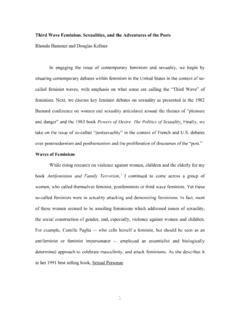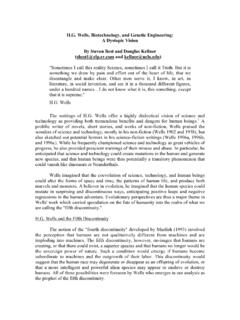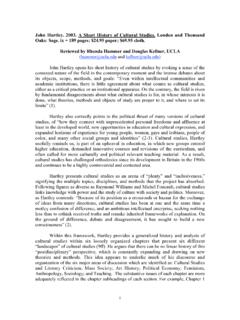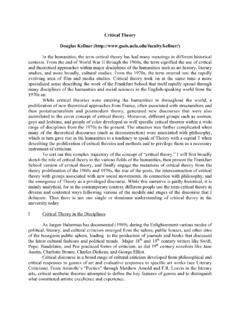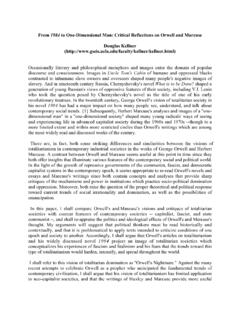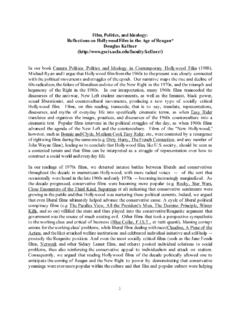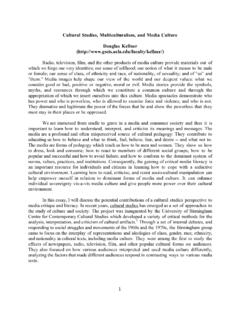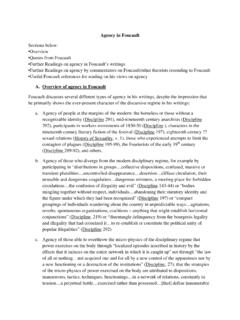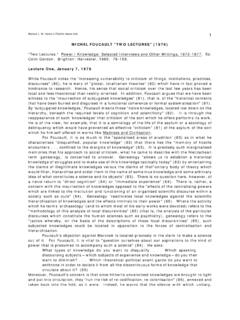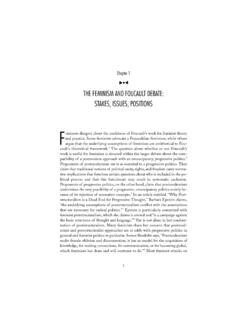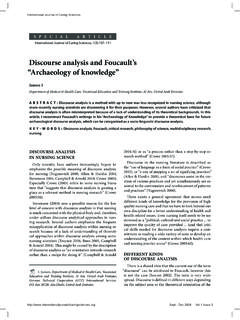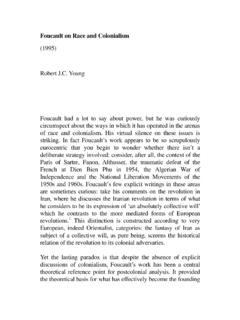Transcription of Postmodern Theory - Chapter 2 Foucault and the Critique of ...
1 41 Postmodern Theory - Chapter 2 Foucault and the Critique of ModernityIs it not necessary to draw a line between those who believe that we cancontinue to situate our present discontinuities within the historical andtranscendental tradition of the nineteenth century and those who are making agreat effort to liberate themselves, once and for all, from this conceptualframework? ( Foucault 1977: p. 120)What s going on just now? What s happening to us? What is this world, thisperiod, this precise moment in which we are living? ( Foucault 1982a: p. 216)[T]he impression of fulfillment and of end, the muffled feeling that carries andanimates our thought, and perhaps lulls it to sleep with the facility of itspromises.
2 And makes us believe that something new is about to begin,something that we glimpse only as a thin line of light low on the horizon - thatfeeling and impression are perhaps not ill founded ( Foucault 1973b: p. 384). Foucault s Critique of modernity and humanism, along with his proclamation of the death ofman and development of new perspectives on society, knowledge, discourse, and power, hasmade him a major source of Postmodern thought. Foucault draws upon an anti-Enlightenmenttradition that rejects the equation of reason, emancipation, and progress, arguing that aninterface between modern forms of power and knowledge has served to create new forms ofdomination.
3 In a series of historico-philosophical studies, he has attempted to develop andsubstantiate this theme from various perspectives: psychiatry, medicine, punishment andcriminology, the emergence of the human sciences, the formation of various disciplinaryapparatuses, and the constitution of the subject. Foucault s project has been to write a Critique of our historical era (1984: p. 42) which problematizes modern forms of knowledge,rationality, social institutions, and subjectivity that seem given and natural but in fact arecontingent sociohistorical constructs of power and Foucault has decisively influenced Postmodern Theory , he cannot be whollyassimilated to that rubric.
4 He is a complex and eclectic thinker who draws from multiplesources and problematics while aligning himself with no single one. If there are privilegedfigures in his work, they are critics of reason and Western thought such as Nietzsche andBataille. Nietzsche provided Foucault , and nearly all French poststructuralists, with theimpetus and ideas to transcend Hegelian and Marxist philosophies. In addition to initiating apostmetaphysical, posthumanist mode of thought, Nietzsche taught Foucault that one couldwrite a genealogical history of unconventional topics such as reason, madness, and thesubject which located their emergence within sites of domination. Nietzsche demonstratedthat the will to truth and knowledge is indissociable from the will to power, and Foucaultdeveloped these claims in his Critique of liberal humanism, the human sciences, and in his laterwork on ethics.
5 While Foucault never wrote aphoristically in the style of Nietzsche, he didaccept Nietzsche s claims that systematizing methods produce reductive social and historical42analyses, and that knowledge is perspectival in nature, requiring multiple viewpoints tointerpret a heterogeneous was also deeply influenced by Bataille s assault on Enlightenment reason and thereality principle of Western culture. Bataille (1985, 1988, 1989) championed the realm ofheterogeneity, the ecstatic and explosive forces of religious fervour, sexuality, and intoxicatedexperience that subvert and transgress the instrumental rationality and normalcy of bourgeoisculture. Against the rationalist outlook of political economy and philosophy, Bataille sought atranscendence of utilitarian production and needs, while celebrating a general economy ofconsumption, waste, and expenditure as liberatory.
6 Bataille s fervent attack on the sovereignphilosophical subject and his embrace of transgressive experiences were influential forFoucault and other Postmodern theorists. Throughout his writings, Foucault valorizes figuressuch as H lderlin, Artaud, and others for subverting the hegemony of modern reason and itsnorms and he frequently empathized with the mad, criminals, aesthetes, and marginalizedtypes of all the problems with attaching labels to Foucault s work, we wish to examine theextent to which he develops certain Postmodern positions. We do not read Foucault as apostmodernist tout court, but rather as a theorist who combines premodern, modern, andpostmodern We see Foucault as a profoundly conflicted thinker whose thoughtis torn between oppositions such as totalizing/detotalizing impulses and tensions betweendiscursive/extra-discursive theorization, macro/microperspectives, and a dialectic ofdomination/resistance.
7 We begin with a discussion of his Critique of modernity ( ). Thiscritique is developed in the form of new historiographical approaches which he terms archaeology and genealogy . We shall then explicate Foucault s Postmodern perspectiveson the nature of modern power and his argument that the modern subject is a construct ofdomination ( ). After analyzing the political implications of Foucault s genealogical method( ) and his later studies of ethics and techniques of the self, we shall conclude with somecritical remarks on the tensions and lacunae in his work as a whole ( ). Postmodern Perspectives and the Critique of ModernityI think that the central issue of philosophy and critical thought since theeighteenth century has always been, still is, and will, I hope, remain thequestion: What is this Reason that we use?
8 What are its historical effects?What are its limits, and what are its dangers ( Foucault 1984: p. 249).My objective .. has been to create a history of the different modes by which,in our culture, human beings are made subjects ( Foucault 1982a: p. 208). Foucault was born in Poitiers, France, in 1926 and died in 1984. He began his academic careeras a philosopher, studying with Jean Hyppolite at the Lyc e Henri IV and Althusser at theEcole Normale Sup rieure. Becoming intolerant of the abstractness of this discipline and itsnaive truth claims, Foucault turned to psychology and psychopathology as alternative forms43of study and observed psychiatric practice in French mental hospitals during the early 1950s(see Sheridan 1980).
9 These studies led to his first two books on the theme of mental illnessand began his lifelong preoccupation with the relationship between knowledge and power. Fora time, he was a member of the Communist Party, but could not accept the straitjacket oforthodoxy and broke with them in 1951, holding ambiguous feelings about Marxism through-out his life. Foucault taught in French departments in Sweden, Poland, and Germany duringthe 1950s and returned to France in 1960 in order to complete his doctorat d tat in thehistory of science under Georges Canguilhem. After the May 1968 protests, Foucault becamechairman of Department of Philosophy at Vincennes. In 1970, he was appointed to the (self-titled) chair of Professor of History of Systems of Thought at the Coll ge de France where hetaught for the rest of his s work provides an innovative and comprehensive Critique of modernity.
10 Whereasfor many theorists modernity encompasses a large, undifferentiated historical epoch thatdates from the Renaissance to the present moment, Foucault distinguishes between two post-Renaissance eras: the classical era (1660-1800) and the modern era (1800-1950) (Foucault1989: p. 30). He sees the classical era as inaugurating a powerful mode of domination overhuman beings that culminates in the modern era. Foucault follows the Nietzschean positionthat dismisses the Enlightenment ideology of historical progress: Humanity does notgradually progress from combat to combat until it arrives at universal reciprocity, where therule of law finally replaces warfare; humanity installs each of its violences in a system of rulesand thus proceeds from domination to domination ( Foucault 1977: p.)
